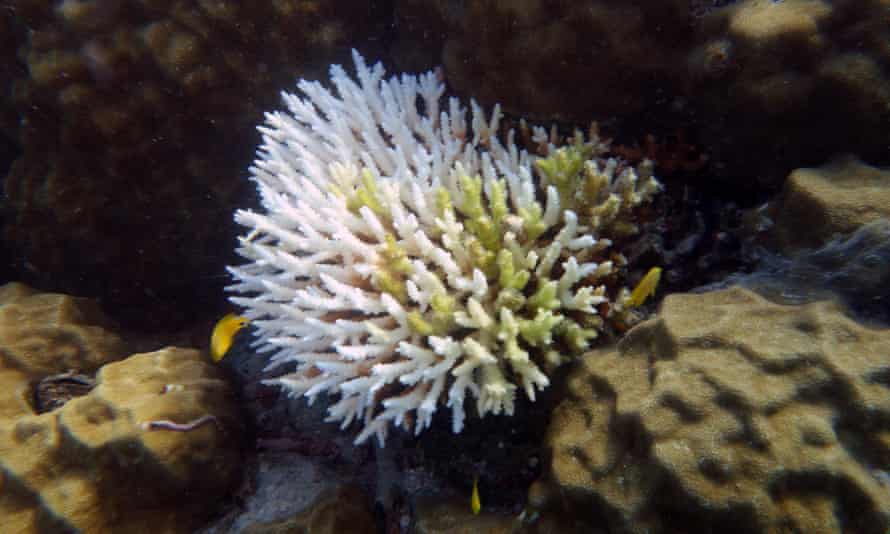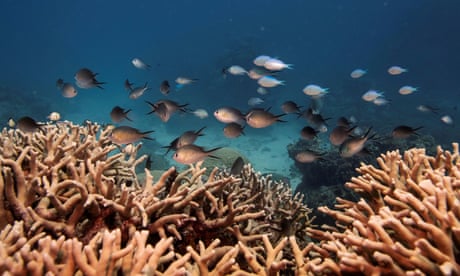Extract from The Guardian
Exclusive: Unesco’s Fanny Douvere denies any political interference, noting the reef’s outlook has gone from ‘poor to very poor’

Unesco’s Fanny Douvere says the suggestion Australia was reassured about the Great Barrier Reef’s status was not true.
Last modified on Wed 23 Jun 2021 03.31 AEST
A senior Unesco official has rejected the Australian government’s claims it bowed to political pressure when deciding to recommend the Great Barrier Reef be placed on the world heritage “in danger” list.
Dr Fanny Douvere, of Unesco’s World Heritage Centre in Paris, also rejected a suggestion from the Australian environment minister, Sussan Ley, that the UN body had told the government a week ago it would not be recommending the listing.
Douvere said the United Nations Educational, Scientific and Cultural Organization (Unesco) had not provided – either formally or informally – any assurances to Australia before the decision was announced early on Tuesday.
On Tuesday, Ley accused Unesco of a “complete subversion of normal process” and said the government would fight the recommendation, which is due to go before the world heritage committee next month.
“This decision was flawed and clearly there was politics behind it … for the World Heritage Committee not to foreshadow this listing is appalling,” Ley said.
Ley claimed her officials were “blindsided” by the announcement and had been assured only a week ago that the reef would not be slated for the “in danger” list.
Ley and the foreign minister, Marise Payne, called the Unesco director general, Audrey Azoulay, to make it “clear that we will contest this flawed approach,” the environment minister said.
Douvere, who leads the marine program at the centre, rejected outright that Unesco would have offered any indication of its decision that would have led the Australian government to be surprised or blindsided, as was claimed.
“No. There was no such recommendations made at any point,” she said from Paris.
“There is no doubt, based on the scientific information, that the Great Barrier Reef is in danger and it is important that the international community is aware of that. There is no process or procedure that requires us to share the content [of reports].”
Ley’s accusation that political pressure had been placed on Unesco to come to a decision, which in some media was said to be coming from China, was “not correct, at all,” Douvere said.
“There is absolutely zero influence. This is simply not the truth. There is no interference at all. Unesco have absolutely no interest in doing this. We stand for helping state parties to raise awareness and make sure these sites are protected for future generations.”
She said the Chinese government was “not aware” of the recommendations being made.
Douvere said it would be up to the 21-member world heritage committee – which includes Australia and is currently chaired by China – to make the final decision based on Unesco’s recommendation.
The “in danger” recommendation was made on science-based reports from Australia, including from the Great Barrier Reef Marine Park Authority and official government reports on water quality, the senior Unesco official said.
“This decision is not a surprise to anyone. We have been working constructively [with Australia] for a decade. There has been bleaching in 2016, 2017 and 2020.
“All the information points in the same direction, that the reef is deteriorating and the outlook has gone from poor to very poor.”
Douvere also rejected suggestions from Ley that the reef had been “singled out”. She said the process to assess the reef in time for the upcoming meeting of the World Heritage Committee in July had begun years ago.
“We followed the procedure here and looked at the state of conservation [of the reef]. It is such that climate change is the critical impact. Unesco’s mandate is to look at the facts.”
She said it was up to Australia and all other members of the world heritage convention to increase efforts to cut greenhouse gas emissions.
“The world as whole needs to step up action on climate change,” she said.
“It is very clear that climate change is the overarching threat to the reef and we are very aware that Australia alone can’t save the Great Barrier Reef. We need to see this as a positive move forward for the international community to step up. The window of opportunity is getting smaller and smaller as the world warms up.”

No comments:
Post a Comment